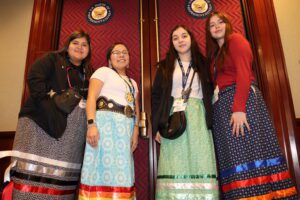The 2024 USET Impact Week Youth Summit
October 14, 2024 by
 What is the United South and Eastern Tribes Inc. (USET)?
What is the United South and Eastern Tribes Inc. (USET)?
For over 30 years, Close Up has partnered with USET to foster civic and democratic engagement among students from USET’s member tribal nations. USET is a nonprofit, intertribal organization established in 1969. It serves 33 federally recognized tribal nations from the northeastern woodlands to the Everglades and across the Gulf of Mexico. USET is dedicated to enhancing the development of tribal nations, improving the capabilities of tribal governments, and elevating the quality of life for citizens of its member nations through various technical and supportive programmatic services.
What is the USET Impact Week Youth Summit?
The 2024 USET Impact Week Youth Summit lasted seven days and six nights and featured workshops on tribal sovereignty, federal politics, and pressing issues facing Indigenous communities across North America. These sessions aimed to cultivate essential leadership skills and empower young people to voice their opinions and actively participate in their communities. Through guided inquiry, workshops, dialogue, and deliberation, attendees learned more about their rights and responsibilities as citizens of tribal nations and members of their communities. The summit also fosters partnerships among tribal communities, allowing youth to share best practices in civic engagement and to learn from one another.
The 2024 USET Impact Week Youth Summit culminated in the presentation of a collective Youth Statement on Sovereignty, articulated by 88 high school students from 18 member tribal nations. This statement highlighted the importance of preserving tribal sovereignty across five sectors:
- Education: Tribal nations want control over education to preserve Native American languages and promote accurate historical narratives, stressing the need for support to enhance Indigenous youth’s cultural connections and educational outcomes.
- Economic Development: There’s a call for economic sovereignty to increase financial independence and diversify beyond gaming revenues.
- Crime and Public Safety: Youth emphasize the need for recognition of tribal nations’ authority to prosecute crimes and advocate for strong federal relationships to ensure community safety.
- Land and Natural Resources: The statement highlights that tribal sovereignty includes stewardship of land and resources, urging advocacy to reclaim ancestral lands.
- Health Care: Participants call attention to health care disparities and seek culturally responsive solutions and support for Native health care providers to improve community health outcomes.
This collective statement underscores the students’ commitment to defending, exercising, and maintaining tribal sovereignty as vital for the future of their communities.
What is Tribal Sovereignty?
Tribal sovereignty refers to the right of tribal nations to govern themselves and make decisions that suit the needs of their communities. This means they have the authority to manage their affairs, including law enforcement, education, and land stewardship. As of 2024, there are over 574 federally recognized tribes, each with unique cultures, traditions, and government structures.
Why is Tribal Sovereignty Important to Tribal Nations?
Sovereignty is inherent to tribal nations and holds significant cultural and community meaning for Indigenous peoples throughout the United States. It is also shaped by treaties and agreements made with the U.S. government and recognized through legislation, statutes, executive orders, and Supreme Court rulings. There are many areas in which tribal nations exercise their sovereign status, including:
- Cultural Preservation: Sovereignty helps tribes maintain their languages, traditions, and identities.
- Self-Determination: Tribes can make decisions that reflect their needs and values rather than rely on outside governments.
- Economic Development: Sovereignty allows tribes to develop businesses and create jobs, thereby improving their communities.
- Legal Authority: Tribes can enforce their own laws and address issues within their communities.
- Environmental Stewardship: Many tribes prioritize sustainability and protect their natural resources.
Despite its importance, tribal sovereignty faces challenges. Sometimes, state and federal governments might overreach into tribal affairs, which undermines the authority of tribal nations. For example, disputes over land rights, taxation, and criminal jurisdiction can lead to tensions between tribal nations and other government entities.
 Conclusion
Conclusion
Participants leave the USET Impact Week Youth Summit feeling empowered and connected to the USET/Close Up community, equipped with knowledge and pride in their identities. By investing in the next generation of Indigenous leaders, USET and Close Up play a vital role in preparing youth to address the evolving challenges within Indian Country. The impact of these experiences is profound, shaping future advocates who will champion their distinct cultures and serve the needs of their diverse communities.
This summit is one of several impactful Close Up programs that focus on helping students study and address the issues affecting Native American youth and their tribal communities. If you would like to learn more about the USET Impact Week Youth Summit, the American Indian and Alaska Native Youth Summit, or other Close Up programming opportunities, reach out to us today!







